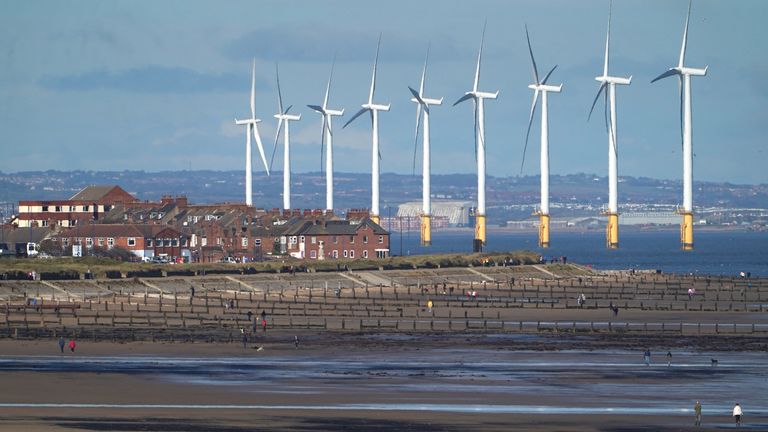Rishi Sunak is planning to delay energy efficiency targets for rented homes following pressure from landlords about the cost of the improvements.
The overhaul is part of a wider review of the government’s environmental policies, which some Tory MPs fear are too expensive and will hurt the party’s chances at the next general election.
Politics Live: Green policies shouldn’t penalise people, says Gove
The current proposals would see all new tenancies required to have an energy performance certificate (EPC) rating of C or above by 2025 – where A is the best and G is the worst – with this expanded to all existing tenancies by 2028.
The policy is intended to reduce bills for tenants and stop leaky homes adding to emissions, but on Tuesday night, a Whitehall source pointed to the cost it would have on landlords.
They told Sky News: “We remain committed to our environmental objectives but we cannot overburden landlords facing cost of living pressures…we support delaying requirements for new minimum energy efficiency requirements in the private rented sector.”
As well as delaying the targets, the government wants to overhaul the EPC system.
The source said: “More generally, we recognise that the EPC system which was designed as an informational tool to meet the requirement of EU membership, needs fundamental reform. Further details will be set out as soon as possible.”
The change, first reported by the Financial Times, is likely to anger campaigners who earlier this week urged the government to stick to its plan.
After Michael Gove, the Housing Secretary, said he believed ministers were asking “too much too quickly” of landlords, Chris Venables, political director of the Green Alliance think tank, said: “With millions of people on the front line of a cost-of-living crisis driven by sky-rocketing energy bills, it is alarming to see Sunak proposing to weaken already insufficient plans to make sure renters have well-insulated homes.
“Letting landlords off the hook will only further risk the government missing its legally binding climate and fuel poverty targets, never mind playing politics with the lives of the elderly and the vulnerable as we head into another difficult winter.”
Climate change think tank E3G estimated that improving energy efficiency would save renters an average of £570, but landlords would be expected to pay the first £10,000 of any energy efficiency work themselves.
Ben Beadle, chief executive of the National Residential Landlords Association, said ministers need to develop a proper plan that includes a fair financial package to support improvements in the private rented sector.
Flagship recycling policy to be delayed
The government also confirmed on Tuesday that it is delaying its flagship recycling reforms by a year following industry warnings the scheme will drive up food prices.
The Department for the Environment, Food and Rural Affairs (DEFRA) said plans to force manufacturers to cover the costs of collecting and recycling packaging will be pushed back by a year to help drive down inflation.
The Extended Producers Responsibility (EPR) scheme was due to come into effect in October 2024, but will now take off in October 2025.
The change follows months of campaigning from food and retail bosses, who argued the reforms will cost manufacturers £2bn annually and likely prompt further price increases.
Read More:
What are the Conservatives’ green policies – and what could be scrapped?
DEFRA said it will use the additional year to discuss with industry ways to “reduce the costs of implementation wherever possible”.
The government is reviewing its green policies after the Conservative’s narrow and unexpected by-election victory in Uxbridge last week.
Labour’s loss was widely attributed to a backlash over the expansion of ULEZ, which would charge drivers of old polluting petrol and diesel vehicles at least £12.50 per day.
The result has reignited a debate on the cost and speed of policies to reduce carbon emissions.
Some Tories believe creating a dividing line with Labour on the issue will help them gain ground on the Opposition in the polls.
On Monday, Downing Street said that ministers are scrutinising existing net zero pledges “in light of some of the cost-of-living challenges”.
And Rishi Sunak said that while the UK is still committed to reaching the climate target by 2050, any legislation to encourage a green switch would have to be “proportionate and pragmatic” and not add extra costs and “hassle” to households.

